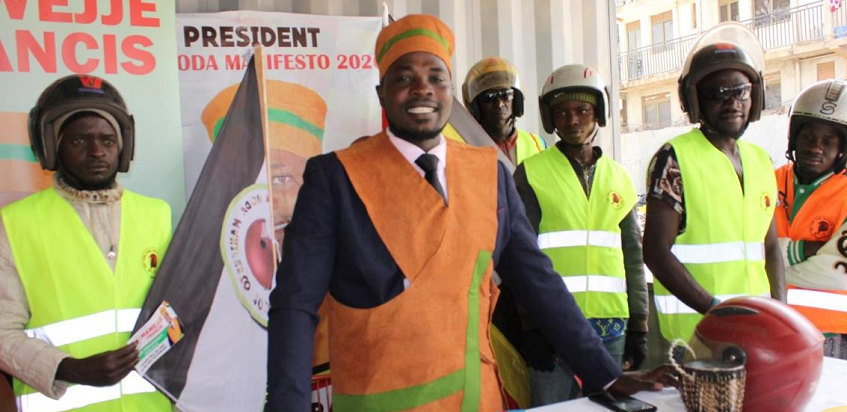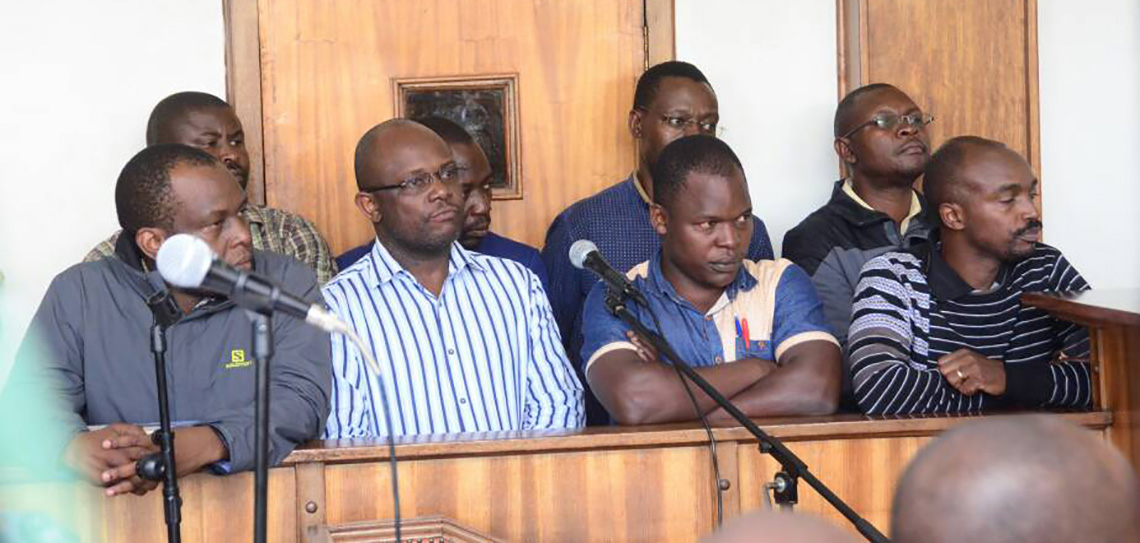Mawejje in brown hat with his team
A 30-year-old Boda-Boda rider, Francis Mawejje, has declared his candidacy for Uganda’s presidency in the upcoming 2026 general elections. A graduate of Diplomacy and International Relations, Mawejje casts himself as a voice for the voiceless and a leader of a new generation determined to challenge the status quo.
While launching his bid, Mawejje took aim at what he described as “four decades of suffering” under the ruling National Resistance Movement (NRM). He pledged to usher in reformatory leadership rooted in economic justice, social equity, and systemic reform—principles he has bundled under the term “Boda-Boda Economy,” which he uses to describe Uganda’s pervasive hand-to-mouth existence.
“This economy is built on risk, survival, and uncertainty,” he said. “From boda boda riders to mobile money operators, restaurant owners, farmers, and civil servants, everyone is surviving, not living. There’s no support system, no safety net, and no future unless we change course.”
Mawejje detailed the plight of ordinary citizens—boda riders injured without medical coverage or insurance, traders whose livelihoods are shattered by city enforcement, and farmers whose investments rot due to poor roads and plummeting market prices. “Our people are trapped in an endless cycle of economic accidents,” he said.
“No savings, no stability. You work, you pay rent, buy food, transport, and data, and you end the month with nothing left. You’re living, but you’re also bleeding. That is the Boda Economy.” Turning to national governance,
Mawejje slammed state inefficiency, corruption, and misplaced budget priorities. He questioned government decisions, such as the allocation of Shs17 billion to Mulago National Referral Hospital, compared to Shs18.2 billion for medical supplies at Uganda Revenue Authority (URA), which employs around 2,000 people.
“Why does a tax collection agency receive more money for medical supplies than the country’s biggest public hospital?” he asked. “It’s because public health is not a priority. Instead, we’ve built a Private Mulago inside Mulago. We are forced to buy medicine from First Pharmacy—who owns that pharmacy? These are the questions we must ask.” He also cited Lubowa Hospital as a symbol of the government’s skewed priorities—land given to investors, public funds borrowed for construction, and doctors trained abroad, while citizens grapple with drug shortages and underfunded hospitals. “We, the taxpayers, are footing the bill while the benefits go elsewhere,” he said.
Mawejje decried what he described as the erosion of meritocracy and fairness in employment, pointing to how government jobs are often awarded based on tribal connections or political loyalty rather than merit. He also lamented the high cost of raising children through a public education system that “often fails to deliver quality or opportunity.” To address these challenges, Mawejje outlined a Seven-Point Program forming the core of his presidential platform.
He pledged to begin by tackling youth unemployment through empowering young people with skills, jobs, and opportunities to thrive locally rather than flee abroad. He promised to revamp the health and education sectors by establishing insurance schemes for boda riders, upgrading public hospitals, ensuring emergency response services, and separating the Ministry of Education from Sports. He plans to rationalize government structures by reducing the duplication of districts, constituencies, and public agencies.
Mawejje also proposed constitutional reforms including a review of presidential powers, enabling diaspora and prisoner voting rights, and launching a constitutional conference. He vowed to fight corruption by holding public officials accountable for embezzlement and financial mismanagement. He emphasized the need to address the Nile question by advocating for sustainable water use, climate resilience, and regional security. Lastly, he pledged to lower the cost of production by promoting exports, stabilizing currency value, and fostering investor confidence.
Framing his campaign in spiritual and historical terms, Mawejje drew parallels with biblical stories. “Just like the Israelites, we have suffered enough,” he said. “This is our time to rise. Our 40 years of oppression must come to an end.” He condemned what he termed the “normalization of national deception,” criticizing lavish government spending on luxury vehicles, entertainment, and foreign travel while civil servants go underpaid and public infrastructure crumbles.
“This government has reduced its citizens to beggars, but we must say enough is enough,” he stated. He also criticized the government’s political tactics—buying out opposition, suppressing dissent, and silencing critics through intimidation or reward. “In this country, it’s not what you know but who you know. Even internships require bribes. We must break this system.” “I, Mawejje Francis, fully declare my intention to run for President of the Republic of Uganda. I represent the children of the Boda Economy, the youth without jobs, the families without healthcare, and the citizens without a voice. It is time we walked the talk,” he declared.
-URN





